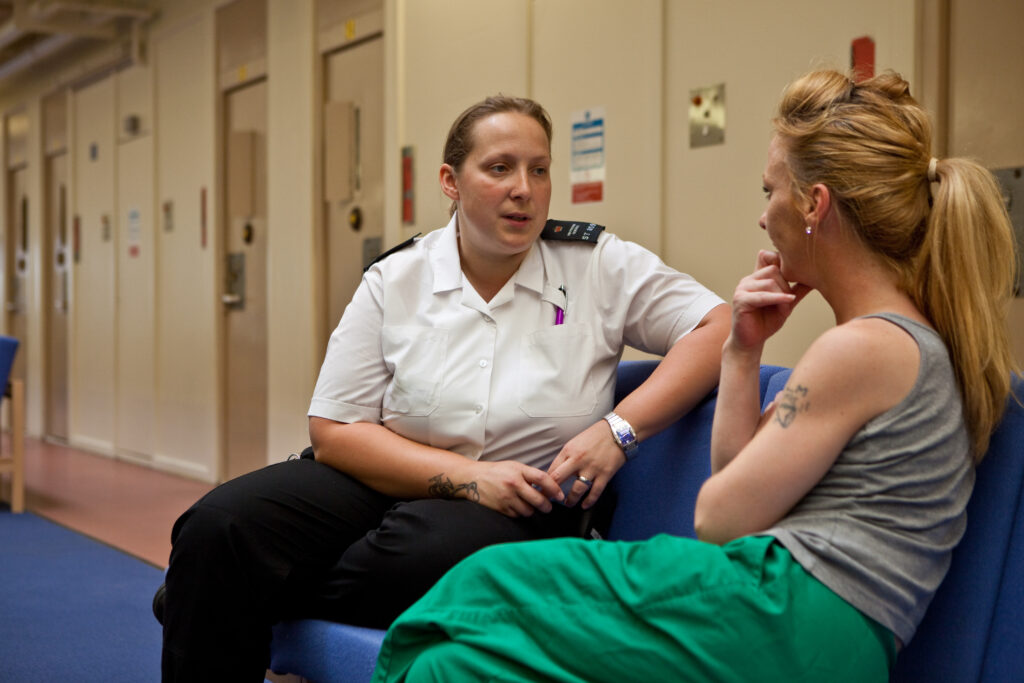
© Andy Aitchison
- New briefing from the CJA opposes unnecessary prison building plans and sets out the practical steps the government can take to reduce the prison population while building safe, thriving communities.
- The CJA calls for a new purpose of rehabilitation in prisons to be enshrined in law.
- The briefing raises concerns about inconsistencies among prisons, which will be exacerbated by the building of new ‘state of the art’ prisons. Instead, the government should invest to level up standards and provision across the existing prison estate.
The government recently announced it would publish a White Paper, setting out reforms within the prison system to help cut reoffending. The justice secretary Dominic Raab has signalled that the White Paper will focus on improving education and employment opportunities for people in prison and helping them maintain their family ties.
While these are positive suggestions, they come at a time when the prison population is set to swell considerably. Against all the evidence on what works to reduce crime, prison building plans are gathering pace, an influx of police officers could mean more people are swept into the criminal justice system, and the policing and sentencing bill will see people spending much longer periods of time in prison. The latest government analysis suggests that the prison population will rise by an alarming 18,800 people within five years. But there is another way.
The Criminal Justice Alliance (CJA) has today published a new briefing which sets out what the government should include in the Prisons White Paper. It lists the practical steps the government can take to truly reduce crime, by ensuring people in or leaving prison have access to meaningful education and employment, as well as support with family ties and positive social relationships. The briefing draws on the expertise of CJA members working in these areas. However, we hope the government will formally consult on its plans so we can give more detailed feedback.
We call for prisons to have the statutory purpose of rehabilitation. Enshrining this purpose in law would support prison governors to develop regimes, policies and processes that enable an aspirational, rehabilitative culture.
In the briefing, we oppose the expensive and unnecessary plans for prison expansion. We lay out the numerous ways the government could reduce the prison population while ensuring safer, thriving communities. This includes diverting people away from custody into community sentences, which will more effectively help them address the root causes of their offending. The government has an excellent opportunity to begin reducing the prison population by removing the tougher sentencing measures in the policing and sentencing bill — which lack any evidence behind them that they will improve public safety — and instead introduce some smart measures such as a presumption against short sentences.
In the briefing, we also call for prisons to be given the new statutory purpose of rehabilitation. Enshrining this in law would support prison governors to develop regimes, policies and processes that enable an aspirational, rehabilitative culture, which prioritises purposeful activity and meaningful connections. It would help make clear that deprivation of liberty is the punishment and that prisons should focus on rehabilitation as their key purpose.
The focus on social capital and relationships is key at a time when most people in prison have spent prolonged periods in their cells during the COVID-19 pandemic, which has harmed both their physical and mental welfare.
The role of prisons should be to address the root causes of why someone offends, helping them navigate out of the powerful currents of crime to safer, more stable shores. This process is often connected to the material, social and psychological aspects of a person’s life, such as family, relationships, employment and education, as well as hope, motivation, having agency and responsibility and being believed in. The White Paper should acknowledge these desistance principles and embed them in the approach to rehabilitation and resettlement. The focus on social capital and relationships is key at a time when most people in prison have spent prolonged periods in their cells during the COVID-19 pandemic, which has harmed both their physical and mental welfare.
Finally, we set out measures to level up provision and standards across all prisons. Members told us that there are inconsistences across the prison estate in terms of family contact, basic hygiene standards, access to education and training, as well as use of technology. Building new ‘state of the art’ prisons will further entrench this inequality. Resources should instead be focused on improving infrastructure and facilities across the current estate.
We also call on the government to use this opportunity to improve outcomes and opportunities for those who we know receive poorer treatment and resettlement support, such as Black, Asian and minority ethnic people.
Read the report, Purpose and connection: A briefing in advance of the Prisons White Paper. If you have any queries or would like more information about these issues, please contact Hannah Pittaway, Senior Policy Officer,
on: hannah.pittaway@criminaljusticealliance.org.uk.



